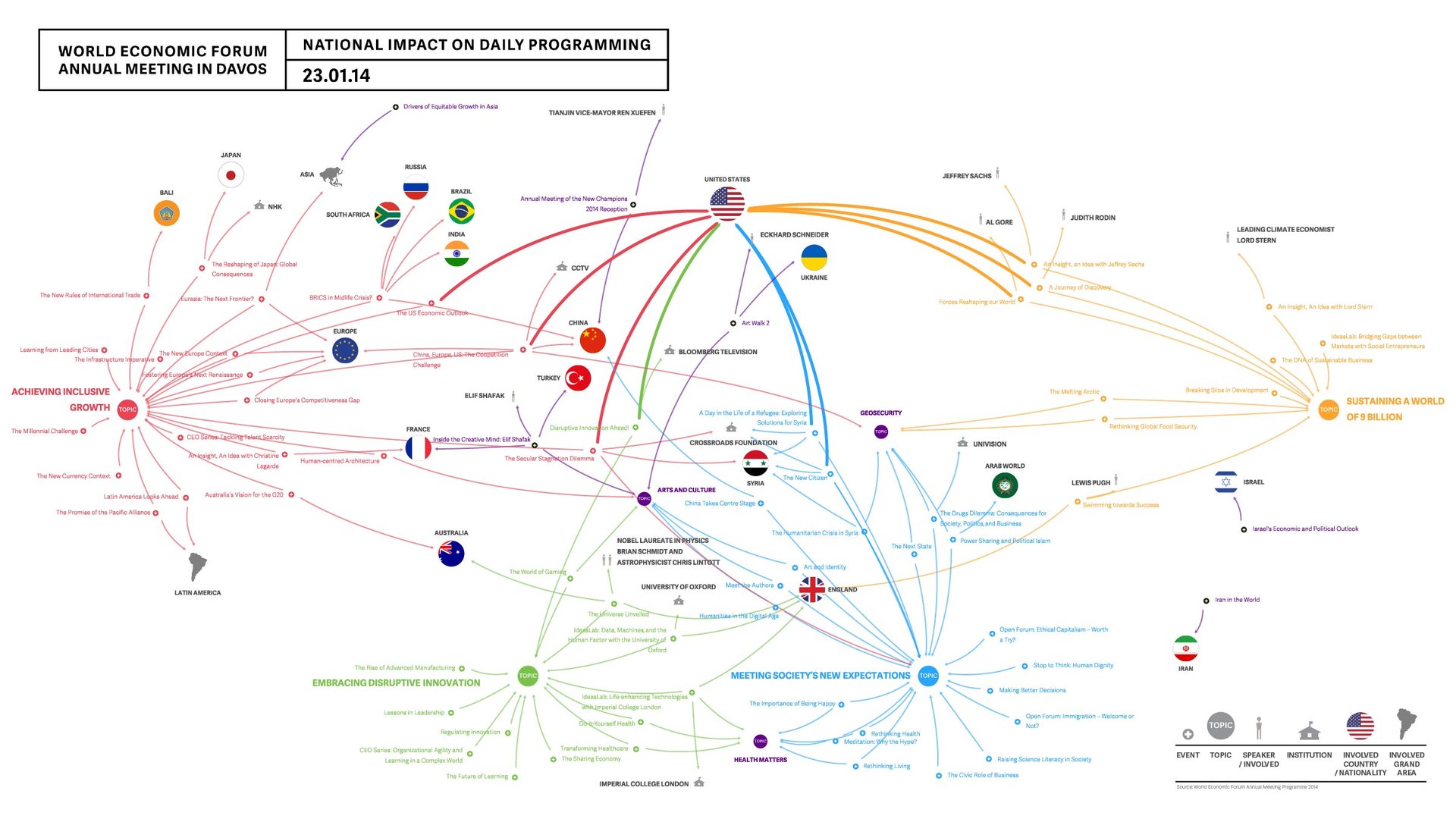Here’s what you need to know from Thursday at Davos
The infographic above showcases Thursday’s full slate of programming, the individuals and institutions involved, and the relative impact of participating nations. View it enlarged here.


The infographic above showcases Thursday’s full slate of programming, the individuals and institutions involved, and the relative impact of participating nations. View it enlarged here.
Davos hit high gear on Thursday, fueled by the words of leaders and thinkers on prominent stages of all types. Here are the day’s highlights so far.
THE WEF OF NATIONS The panel “The Reshaping of Japan: Global Consequences” agreed that Japan must overcome an aging and shrinking population (set to halve by 2100) and strained relations with neighbors like China and South Korea. Columbia professor Joseph Stiglitz observed that the “efficiency innovations” described by Harvard professor Clayton Christensen, in which nations lose jobs to technological advancement, may allow Japan to remain competitive despite its population decline. The panel followed Wednesday’s keynote by Prime Minister Shinzo Abe, who focused on Japan’s diplomatic and economic outlook.
Iranian President Hassan Rouhani spoke about his long-term social, economic, and political plan of “prudent moderation” to build an economy that “has the potential to be among the world’s top ten in the next three decades.” Vali Nasr of Johns Hopkins said that Iran is going to be “the mother of all emerging markets.”
Israeli Prime Minister Benjamin Netanyahu detailed six driving factors of his “innovation nation”–broad defense operations (“a curse turned into a blessing”), developing young knowledge workers, research investment of up to 5% of GDP (recently emphasizing cybersecurity), a culture of inquiry, small size breeding collaboration and competition, and being forced to innovate in the face of lacking natural resources and regional isolation.
The Guardian distilled the address of Australian Prime Minister and 2014 G20 Chair Tony Abbott, who advocated free markets and trade while criticizing stimulus programs of his predecessors as overspending. Mexican President Enrique Peña Nieto spoke about energy and other reforms in his nation with an average age of 27, and policy leaders from each of the BRICS exchanged growth and stability plans to fight a “midlife crisis.”
ONWARD AND DISRUPTWARD At the “Disruptive Innovation” panel, Publicis Groupe chief Maurice Levy envisioned consumers trading today’s overwhelming marketing culture for tailored messages driven by data. Qualcomm head Paul Jacobs called consumer opt-ins for control of such messages essential, and Wal-Mart’s incoming President and CEO Doug McMillon echoed the need to ensure trust and add value as privacy-minded customers are pitched personalized deals. Wal-Mart is a technology company, McMillon said. “You haven’t seen our information technology budget. It’s big.”
HANDS OFF MY INNOVATION The “Regulating Innovation” panelists agreed that new innovation centers should look to Silicon Valley while also utilizing local talent and resources (though 66% of the Valley’s engineers are foreign-born–the brain drain battle is on). Idealab’s Bill Gross described “permissionless innovation,” where red tape doesn’t stall new ideas, and the panel supported economic efficiency zones establishing Shenzhen-like clusters of similar businesses.
HUNGER GAMES The “Rethinking Global Food Security” panel marked Africa as the central target of global agricultural reform, cast the drive to reduce the world’s 850 million hungry people as a moral imperative and smart investment decision, and called for the empowerment of women farmers as well as R&D work on big obstacles such as food storage and waste.
MILLENIALS AREN’T WORKING Youth unemployment is a virulent and lasting worry, warned a panel called “The Millennial Challenge.” Maria Fanjul, a young entrepreneur from Spain, blamed a risk-averse culture, misguided vocational guidance, and lacking entrepreneurial incentives. Klaus Kleinfeld, Alcoa CEO, pointed to a “great mismatch” between employees’ qualifications and employers’ needs for more practical but cutting-edge training in fields like computer coding.
BUILDING BUZZ At an Open Forum discussion and elsewhere, young members of the WEF’s Global Shapers program shared personal stories of starting ventures and lobbied on behalf of entrepreneurs. Their unofficial motto, as put by Robert Greenhill of the WEF board, is “Don’t do things about us without us.”
ALPS AL Former Vice President Al Gore deployed his arsenal of striking images and rhetoric to illustrate global challenges. He listed his six drivers of global change, predicted massive impact for 3-D printing, criticized blind spots in GDP measurement and the pressures of the quarterly earnings report cycle, and explored population growth while stating that half of all babies born this year will reach their 100th birthday.
EUROPE LOOKS TO STARTUPS The Davos launch parade continued with the below Twitter announcement by EU Vice President Neelie Kroes, who focuses on digital intiatives, of the new European Digital Forum.
CONTINUING COVERAGE Yesterday we looked at the “wild wild west” of the Internet of Things and South Korean President Park Guen-hye’s plan for reduced regulation. Our reports will continue through Saturday.
This article was produced on behalf of Bank of America by the Quartz marketing team and not by the Quartz editorial staff.